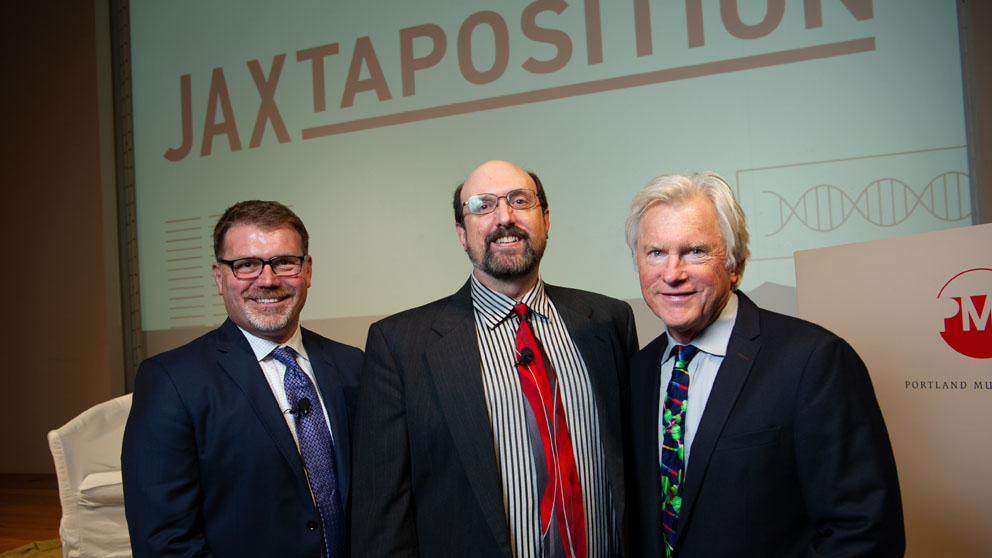
L-R: Brad Smith, M.Ed., Senior Director of Development, Associate Professor Greg Cox, Ph.D., and David Shaw, chair emeritus of the Laboratory’s Board of Trustees. Photo by Brian Fitzgerald.
The genetic study of rare diseases is giving us insight into how to examine and treat more common diseases, said JAX experts at a recent JAXtaposition event in Portland, ME.
During a fireside chat at the Portland Museum of Art, Associate Professor Greg Cox, and Brad Smith, M.Ed., Senior Director of Development, discussed how we can use genetics as a discovery tool, as a therapeutic tool, and as a way to understand massive genetic questions that relate to disease in general.
Cox studies the genetics of degenerative muscle diseases using mouse models for spinal muscular atrophy (SMA), amyotrophic lateral sclerosis (ALS), muscular dystrophy and more.
He is part of the Laboratory’s Rare and Orphan Disease Center, which addresses conditions that, while individually rare (by definition, affecting fewer than 200,000 people in the U.S.), collectively affect about one in 10 Americans, according to the National Organization for Rare Disorders, and thus represent a major health issue. About 80 percent of rare diseases are genetic in origin, about half affect children, many are fatal, and very few have cures.
David Shaw, a life trustee and chair emeritus of the Laboratory’s Board of Trustees, and a longtime supporter of the Laboratory, introduced the event. “It's amazing to have an institution like this in the state of Maine in a time of probably the most transformational scientific revolution of all time, the genetics revolution,” he said.
An invaluable resource
Cox cited JAX’s unique mouse models as an invaluable resource in his study of rare diseases.
“We can identify models, we can make new models, we can actually make a model match exactly what a patient has,” he said. “We have amazing tools.”
Cox acknowledged how challenging it is for individuals with rare diseases to get pharmaceutical companies to develop therapies, since testing therapies for these diseases on the human population simply isn’t possible.
Once a scientist has a model with the same features of the disease that a patient has, for exactly the same reason, there’s something to test, Cox explained.
“If there’s nothing to test, drugs are never going to be developed. These models are invaluable for the next therapeutic step,” he said.
Is every disease a rare disease?
Everybody has a slightly different reason for why they have a given disease, Cox said. And some of the therapies that are being developed are now being designed specifically for certain patients’ mutations.
Cox referenced a patient he knows with cystic fibrosis who has a very common variant in the cystic fibrosis community. “Drugs are being developed specifically for that mutation,” he explained. “And it just so happens that it’s a relatively common mutation in the cystic fibrosis population, so drug companies have multiple patients they can treat.”
But even common diseases, once we start parsing them out, are rare and orphaned diseases. That’s because the specific variant that causes a given diseases is going to account for only a tiny subset of all the patients with that disease, Cox said - hence why strides in the development of personalized medicine are so important.
Genetics as a discovery tool
In the future, with new tools at our disposal, Cox says, we will be able to understand the genetics of both rare and more common diseases, not just the gene itself.
“We aren’t just a single gene functioning (or not functioning, in the case of disease), it’s the combination of all of our genes,” he said.
With mouse models, Cox can mix their genomes and map and identify modifier genes that can impact the onset and severity of different diseases. “We’re hoping that identifying these modifier genes can give us insight into how to modify the disease. Nature figured out how to make the disease less severe, how can we do the same?”
“If I can make a disease less severe, or if I can delay the onset of symptoms for 50 years, I am happy to make whatever impact I can,” he said.